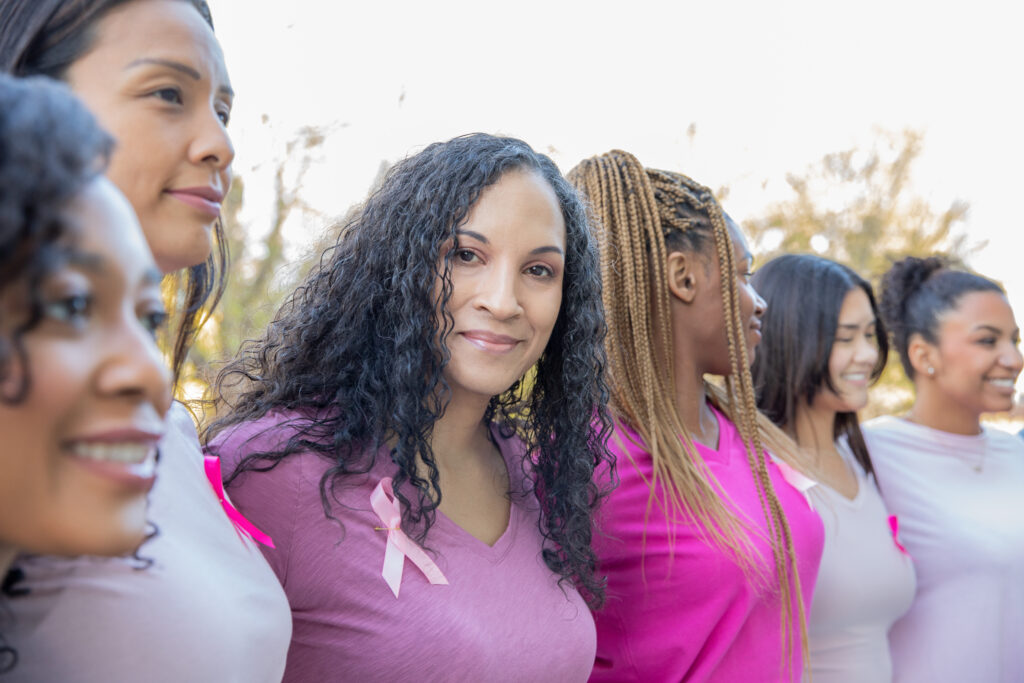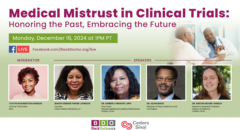
Good news: There’s been an overall decline in breast cancer deaths over the last 30 years. Bad news: Black women have a mortality rate 41 percent higher than that of white women. These differences are multifactorial, but are partly a result of the underrepresentation of Black patients in clinical trials.
Different populations can respond differently to therapies, including differences in side effects; therefore, clinical trials for breast cancer that include Black women are crucial to advancing health equity.
What are clinical trials?
Clinical trials, which are research studies involving human volunteers to evaluate medications, vaccines, or medical devices for safety and effectiveness, are vital in bringing forth new treatments for diseases like cancer. According to the most recent drug trial data from the U.S. Food and Drug Administration (FDA), only 11 percent of the nearly 5,000 participants in the clinical trials of 18 new cancer drugs approved in 2020 were Black or Hispanic.
This highlights the low minority representation in clinical trials, even though these groups are more likely to be affected by certain cancers. This persistent and significant disparity not only hinders the development of effective treatments for Black women with breast cancer but also further perpetuates health inequities.
Why is Black participation in clinical trials important?
It is vitally important that research participants represent the people most impacted by the disease or condition being studied. According to the 2022-2024 American Cancer Society Cancer Facts and Figures for African American/Black People, breast cancer is the most commonly diagnosed cancer among Black women, and an estimated 6,800 deaths from breast cancer occurred among Black women in 2022, making it the leading cause of cancer death in this population.
Additionally, studies have shown a high prevalence of triple-negative breast cancer, a subtype of breast cancer that is aggressive by nature with a complex biology, among younger Black women and those of African descent. Since triple-negative breast cancer does not have any of these receptors, it tends to be more challenging to treat.
For this type of breast cancer, physicians and researchers must understand the potential molecular mechanism(s) by which biology and modifiable factors, such as obesity, for instance, contribute to disparities in triple-negative breast cancer development in Black women.
Black women need to know more about clinical trials
To increase clinical trial awareness and enrollment of Black women with breast cancer, researchers and physicians, including myself, are involved in projects that include patient education, advocacy, and outreach; patient navigation; and physician engagement and outreach for Black women with breast cancer.
This type of work can serve as a guide for increasing clinical trial participation among Black patients with other cancers that disproportionately affect this population, including colorectal, lung, and prostate cancers.
Taking part in a clinical trial involves trust. Distrust in medical professionals from the Black community remains due to the history of healthcare injustices committed against communities of color, such as the Tuskegee study, conducted from 1932 to 1972 by the U.S. Public Health Service, in which researchers knowingly withheld treatment from Black sharecroppers with syphilis to study the progression of the disease.
How clinical trials empower Black women
Black women should feel empowered to take every opportunity available to them to detect breast cancer early through annual mammograms and encourage their family members and friends to do so as well. Black women diagnosed with breast cancer should ask questions, including discussion of clinical trial options, and seek second opinions if necessary, so that they are comfortable with their treatment plans.
If any issues may pose a barrier to receiving treatment or participating in a clinical trial, they should inform the team and be reassured that the medical team is dedicated to helping them navigate or resolve those barriers, so that they can receive the best treatment option. Importantly, they must be engaged in all the avenues available to help decrease breast cancer recurrence.
As more is discovered about breast cancer in Black women, providers need to focus on individualized care, and investigators need to continue diversifying their research. It is imperative that any development of new drugs or interventions from clinical trials are effective for everyone, which will ultimately lead to clinical trial participation to produce more innovative science and accurate information about drug efficacy.
Coral Omene, MD, PhD, is a medical oncologist in the Breast Cancer Program and Program Director for Breast Cancer Disparities Research at Rutgers Cancer Institute of New Jersey and RWJBarnabas Health, the state’s leading cancer program and only National Cancer Institute-designated Comprehensive Cancer Center.








